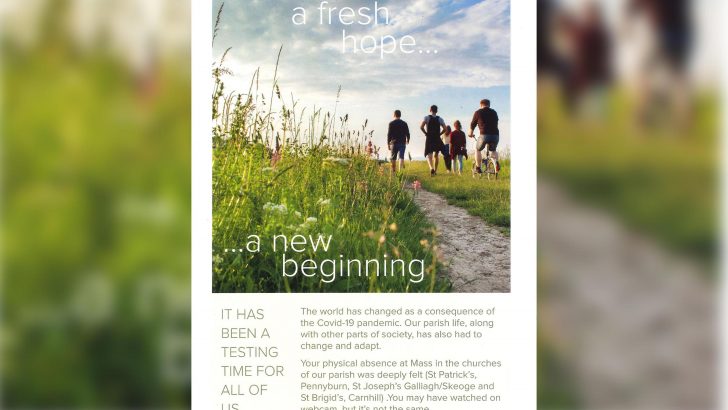“Covid-19 has changed the Church,” we hear. It’s almost a cliché at this stage, but that doesn’t make it wrong. Change is a constant in life – the pre-Socratic philosopher Heraclitus said: “No man ever steps in the same river twice, for it’s not the same river and he’s not the same man”.
Cardinal Newman put it well when he said: “To live is to change, and to be perfect is to have changed often”.
As we return to Mass – admittedly in a limited fashion due to ongoing restrictions – it’s important to ask how Covid-19 has changed the Church and whether we are active participants in shaping the Church of the future or just mere bystanders. Even worse, is the ever-present temptation to be a hurler on the ditch offering little more than a cynical commentary.
A lot of the narrative around the post-pandemic Church speaks of decline: elderly priests and religious who have succumbed to the virus; aging priests who will not return to ministry; ailing parishioners who will be too frightened to come to Mass; those whose faith will have weakened and the cynics who will have felt their life just as good without regular attendance at Mass.
But, where in this is the resurrection? Surely we as Christians are the people who have been to the tombs in which society has buried the Faith and found them empty?
Jesus did not reveal the sacraments as optional extras – they are vital for our communion with God and with one another. As parish communities, we must do all we can to return to Mass “with a purified heart, with a renewed amazement, with an increased desire to meet the Lord, to be with him, to receive him and to bring him to our brothers and sisters with a life full of faith, love and hope” (Cardinal Robert Sarah).
Comfort zones
This will mean leaving our comfort zones. As Pope Francis has observed more than once, when the Church does not come out of herself to evangelise, she becomes self-referential and then gets sick.
“I think about the times in which Jesus knocks from within so that we will let him come out. The self-referential Church keeps Jesus Christ within herself and does not let him out,” Pope Francis writes.
One initiative to try to welcome people back to a fuller expression of their faith that I heard about this week is in the parish of the Three Patrons in Derry. A parishioner wrote to me enclosing a very attractive ‘Welcome Back’ leaflet (picture left) that has been distributed to homes in the parish. “Is a leaflet letterbox drop an effective means of evangelisation?” my correspondent asks. “Probably not,” he writes, “but it is something. And something is better than nothing. Sadly, in many parts, nothing is what is happening at the moment”.
The leaflet goes on to say: “Now is the time of fresh hope in all of our lives. We all need the goodness of God in our lives. Together again at Mass, we receive the gift God gives us in Holy Communion, the gift of himself”.
There are kind words of invitation too for those who may have been away. “If you had dropped out of the way of praying, or coming to church or of allowing God into your life, now is a time of new beginning: You especially are welcome. No one who comes to the Lord is turned away,” the leaflet says.
Hope
Initiatives like the one in Derry are small signs of hope and examples of what can be done when people think creatively about the life of a parish. Jesus in the Gospels is repeatedly depicted inviting people. If we believe that our Faith has something to offer, we have to become more comfortable in inviting others to be with us.
“Never waste a good crisis,” a friend of mine in public relations says. Maybe Covid-19 is a wake-up call for the Church in Ireland to follow the example of Pope Francis and get out of ourselves a bit more and start inviting people to take another look. It’s certainly better than the “we’ve tried nothing and nothing works” mantra of the prophets of doom.


 Michael Kelly
Michael Kelly
